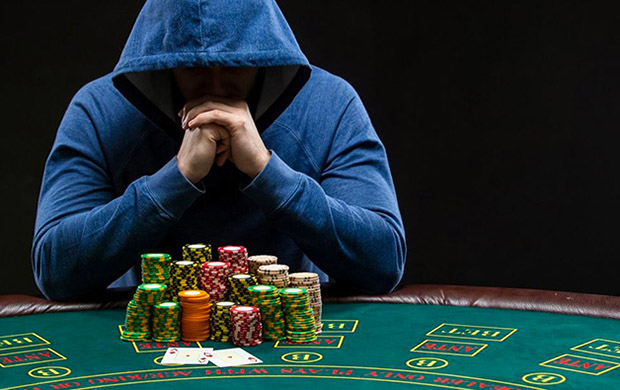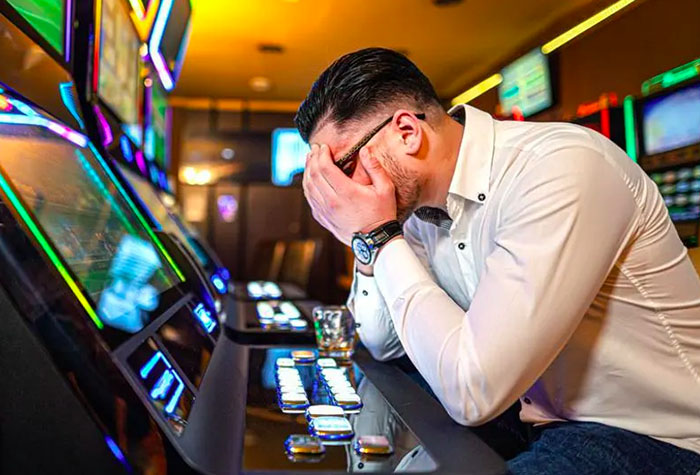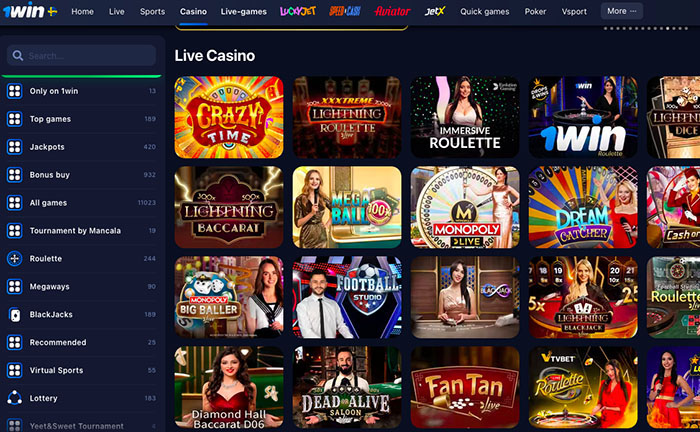Gambling Addiction: What to Do? Detailed Guide
Contents
- 1 Introduction
- 2 What is a gaming addiction?
- 3 How do I know if I have a game addiction?
- 4 Factors that lead to gambling addiction
- 5 The role of casinos in gambling addiction
- 6 What are the consequences of online gambling addiction?
- 7 Can gambling addiction be cured?
- 8 How to help someone quit gambling
- 9 How to stop playing games? First Steps
- 10 Gambling – how do you change your habits?
- 11 Gambling is a financial problem
- 12 Where to turn for gambling addiction: a long list of companies
- 13 Conclusion
Introduction
Gambling can be a fun pastime, but for some players it can become a problem. Attention to the psychological health of players is becoming increasingly important in today’s world of entertainment. Pathological cravings or gaming addiction can seriously undermine a person’s quality of life, lead to financial hardship, ruin relationships and damage public and professional image. In this article, we will look at what a gambling addiction is, how it can be recognized and what steps can be taken to prevent and overcome it.
What is a gaming addiction?
Gambling addiction, or pathological gambling, is a chronic and progressive disease that causes an individual to continue to gamble despite the devastating consequences. It is not just a “bad habit” or lack of self-control, but a serious mental health problem recognized by the American Psychiatric Association. Like other forms of addiction, gambling addiction can occur at any age and in any socioeconomic situation.
How do I know if I have a game addiction?
Identifying a gaming addiction can be difficult, especially if a person is trying to hide their problem. However, there are a number of signs that may indicate the possible presence of a gaming addiction:
- Increasing the stakes. One of the first signs may be the need to increase the stakes in order to experience the same level of excitement.
- Anxiety when trying to stop the game. Players may experience irritability or anxiety when trying to reduce bets or stop playing completely.
- Constant thoughts about the game. A player may be constantly thinking about the game, planning the next game session, or remembering past games.
- Using the game as a way to cope with stress. If a person uses games as a means of managing stress or coping with other problems, it may be a sign of addiction.
- Failed attempts to control, limit, or stop the game. The person may repeatedly try to stop or play less, but without success.
- Financial problems. If a person starts borrowing or selling personal items to pay for gambling, this may indicate a serious problem.
Factors that lead to gambling addiction
- Accessibility and Convenience: the internet has made gambling accessible to anyone with access to the net. This convenience can be a catalyst for gambling addiction, as players can play at any time and from any place.
- Psychological reasons: gambling addiction often occurs as a way to cope with stress, anxiety or depression. Gambling can serve as a way to “disconnect” from the problems and anxieties of everyday life.
- Social factors: social pressure and the desire to “belong” can also lead to gambling addiction.
- Biological aspects: some studies show that people with gambling addiction may have genetic or neurochemical abnormalities that make them more susceptible to developing this condition.
The role of casinos in gambling addiction
Casinos play an important role in encouraging gambling addiction. They give the impression of being able to make money easily and quickly by attracting players with bonuses, promotions, and promises of big winnings. In addition, the design and mechanics of the games are also designed to keep you entertained and enthralled.
Top casinos for safe online gambling
Choosing a safe online casino is an important step to prevent gambling addiction. Some casinos offer self-control tools, such as setting betting limits and playing time, and provide links to resources to help combat gambling addiction. Top reliable online casinos:
1win
1win (review, site) offers options for all tastes, from slots to card games. In addition, the presence of a live casino adds a realistic feel to the gaming experience.
Player safety is a priority for this casino. Advanced data encryption technology is used to ensure the security of transactions and personal information. Also, the company takes serious measures to combat gambling addiction. The casino provides self-monitoring tools and actively cooperates with organizations that provide assistance to those suffering from gambling addiction.
Neospin
Neospin (review, site) is known for its attention to detail. Each game is designed to meet the needs of the most demanding players. Players appreciate Neospin for its generous bonuses and promotions. Reliability and security are key to the company’s success. This casino ensures reliable protection of its customers’ data by using advanced encryption technology.
The company also does all it can to help players control their bets and their time in the game. It provides resources and support for those suffering from gambling addiction, including restrictive measures and links to professional organizations.
21Bit Casino
The main advantage of this casino is its friendly and intuitive platform, making it accessible to beginners and experienced players alike. It also supports a wide range of cryptocurrencies, making it an ideal choice for crypto gamers. Like any reputable online casino, 21Bit Casino (review, site) takes great care of its customers’ security. It uses state-of-the-art encryption technology to ensure the security of data and financial transactions.
The company recognizes the seriousness of the problem of gambling addiction and provides the necessary tools and resources to support its players. The casino offers various self-control mechanisms and actively cooperates with organizations that specialize in combating gambling addiction.
What are the consequences of online gambling addiction?
Gambling addiction can have serious consequences that can affect an individual’s physical, psychological and financial health.
- Financial problems. Gamblers often spend more money than they can afford, leading to debt and financial difficulties.
- Relationship problems. Addiction to the game can lead to conflicts with loved ones who cannot understand or deal with the problem.
- Mental Health. Depression, anxiety and, in some cases, suicidal thoughts or attempts are all possible consequences of gaming addiction.
- Physical health. Long periods of gambling and the stress associated with gambling can lead to health problems such as insomnia, eating problems, and cardiovascular disease.
Symptoms of gaming addiction
Gambling addiction, also known as pathological gambling, is a disease of impulse control. Symptoms can be both physical and psychological. They include:
- Predominant thoughts about gambling: this may include constant recall of past gambling experiences, anticipation of the next game, or thoughts about ways to get money to play.
- Need to Increase Stakes: to reach the desired level of excitement, players may feel the need to increase stakes.
- Unsuccessful attempts to stop or control the game: this may manifest as restlessness or irritability when trying to stop or shorten the game.
- “Chasing” losses: after losing, players may try to “come back” and recover their losses by playing even more.
Warning signs and symptoms
There are certain signs that may indicate a possible gambling addiction:
- Increased time spent playing: if you notice that you are spending more and more time playing, this could be a warning sign.
- Financial difficulties: Unexplained financial problems or a sharp increase in debt could be related to gaming addiction.
- Behavioral changes: includes lying about how much time and money is spent playing games, loss of interest in regular hobbies or responsibilities, and withdrawal from social contacts.

Can gambling addiction be cured?
Yes, gambling addiction can be treated. However, as with any other form of addiction, treatment may take some time and require a combination of different approaches. This may include individual psychotherapy, group therapy, medication and self-help programs.
Myths and facts about gambling problems
Myths and misconceptions about gambling problems can hinder detection and treatment of addiction. Let’s take a look at some of the most common myths and break them down for you.
- Myth 1. Gambling problems only affect weak people.
Fact: Anyone can experience gambling problems, regardless of strength of character. It affects people of all age groups, social and economic classes.
- Myth 2. Gambling problems only develop in those who constantly lose.
Fact: not necessarily at all. Even winnings can increase the desire to keep gambling and eventually lead to problems.
- Myth 3. If you have money, gambling problems cannot affect you.
Fact: Gambling can be a problem even if you have the money to cover your losses. It’s important to remember that the consequences of gambling addiction go far beyond financial losses, encompassing relationships, mental health and overall quality of life.
How to help someone quit gambling
Helping people with gambling addiction is not always easy, but here are some steps you can take:
- Learn what a gambling addiction is. Learn about the problem of gambling, the symptoms and the consequences. This will help you better understand what your loved one is going through and how you can help.
- Discuss the problem. Have an open and honest conversation with this person. Show that you are concerned and willing to help.
- Offer help. Make sure they know about available resources and help services, such as counseling, support groups and treatment programs.
- Support, not control. Remember that the ultimate decision is to leave gambling to the addict. Your role is to support, not control.
How do I behave with people who are addicted to gambling?
Your behavior can play a key role in helping people with gambling addiction. Here are some tips:
- Show understanding. Try to be patient, empathetic, and compassionate. Gambling addiction is a disease, not just a bad habit.
- Support healthy habits. Help them find alternative activities and hobbies that can help take their mind off gambling.
- Avoid legal judgments. Avoid accusations or criticism, which can only add to feelings of guilt or shame.
Four tips for family members
For family members facing a gambling problem, the following tips may be helpful:
- Education. Read more about gambling addiction to better understand what’s going on.
- Self-care. Betting on a healthy lifestyle and taking care of yourself is just as important as taking care of your loved one. Be mindful of your physical and emotional health.
- Setting boundaries. It is important to set healthy boundaries and communicate them clearly to your loved one. This may include not giving money for gambling or discussing gambling.
- Getting Support. Seeking support from others is also important. Consider joining support groups for families of people suffering from gambling addiction.
Intervening in a person’s gambling addiction requires tact, understanding and caring. Remember that your actions can impact your loved one’s life and help them on the road to recovery.

How to stop playing games? First Steps
If you see signs of gambling addiction, here are some steps you can take to overcome the problem:
- Understand the existence of the problem
The first step to recovery is always to acknowledge the problem. This can be one of the most difficult steps to take, but acknowledging the problem is key in the recovery process.
- Join a support group
Support groups help people suffering from gambling addiction feel supported. In these groups, you can share your experiences and strategies for overcoming addiction and get real-world advice to help you.
- Avoid temptations
Avoid places, events, and people that can provoke a desire to gamble. If necessary, block access to gambling sites on your computer and mobile device. Remember that struggling with gambling addiction is a process, and it is important to seek support and help at every step of the process. Don’t hesitate to seek professional help.
- Postpone gambling
If you feel tempted to gamble, try putting it off for a period of time, such as 15 minutes or an hour. This can give you time to rethink your decision and think about the consequences of gambling. If you still want to play after that time, try putting it off for a while longer. This will help you begin to manage your impulses to play.
- Find alternatives to gambling
Instead of devoting your time and resources to gambling, find healthier and more beneficial alternatives. Here are a few examples:
- Physical activity: Taking part in physical activities such as walking, lifting weights, team sports or yoga can help reduce stress and improve your physical and emotional health. Physical activity also helps improve your mood and well-being.
- Meditation: it can help reduce stress levels, improve concentration and promote overall health and well-being.
- Spend more time with friends and family who don’t gamble: connecting with loved ones who support you in your struggle with gambling addiction is very important. They can help you shift your focus to other things and give you the support you need.
- Volunteering in local communities, hospitals, or animal shelters, for example, can be very rewarding and help you take your mind off gambling.
- Exploring new hobbies: this can be a great way to replace the time you previously spent gambling.
- Travel: visiting new places and learning about new cultures can be inspiring and help you broaden your horizons.
The choice of appropriate alternatives depends on your individual interests and preferences. The main thing is that it should be an activity that you like and that can replace the time spent playing.
- Think about the consequences of addiction
Focus on the negative consequences that gambling can bring into your life. This can help keep you motivated to stop gambling. Think back to how gambling has affected your finances, relationships, and emotional well-being. Write these thoughts down and come back to them whenever you feel tempted to gamble.
Gambling – how do you change your habits?
Habits affect many aspects of our lives, and gambling is no exception. Changing habits is not a simple process, but there are several steps you can take:
- Identify the habit you want to change. Often people gamble in response to certain triggers, such as stress or boredom. Determine what triggers your desire to gamble and start there.
- Make a plan. Once you have identified the habit you want to change, make a plan of action. This may include identifying alternative actions you can take in response to the triggers.
- Practice self-control. It’s important to learn to control your impulses and not let them control you. This can be especially difficult with gambling, but it is a critical step in changing habits.
- Start a habit diary. Recording your progress and difficulties can help you see how you are progressing and can serve as motivation to keep going.
Gambling is a financial problem
Gambling can lead to serious financial problems. Here are a few tips that may help:
- Make a budget. Set yourself a clear spending limit on gambling and stick to it strictly.
- Avoid credit for gambling. Borrowing money to gamble will only exacerbate your financial problems.
- Get financial counseling. A professional financial advisor can help you manage your debt and lead a healthier financial life.
- Get help for your gambling addiction
Overcoming gambling addiction is a long and difficult process that requires time, patience, and willpower. But remember that it is possible, and that there are many resources and support that can help you along the way. If you find that struggling with gambling on your own is too difficult, don’t hesitate to seek help. There are many resources that can help you through this struggle. Let’s talk about these next.

Where to turn for gambling addiction: a long list of companies
It’s important to remember that no matter how deep your addiction is or how complicated your situation is, there is always hope and help is available to you. Gambling addiction is a serious problem that any gambler can face. Whether it is a new problem or one that has been struggling for a long time, there are organizations that specialize in helping people with gambling problems. Here’s a list of the best of them:
- BeGambleAware, site: https://www.begambleaware.org/
BeGambleAware is a leading charity in the UK that offers information and support for people who suffer from gambling addiction. They offer a variety of resources including self-assessment, money management tips, self-management advice, and referrals to professional help.
- GamCare, site: https://www.gamcare.org.uk/
GamCare provides information, support and advice to people suffering from gambling problems. The project offers a variety of services, including a help line, online chat, group support and therapy. In addition, extensive information on various aspects of gambling addiction and coping strategies is available on their website.
- Gamblers Anonymous, site: https://www.gamblersanonymous.org/
Gamblers Anonymous is a community of men and women who have come together to solve their common problem and help others recover from gambling. They offer meetings around the world where people can share their experiences, strength, and hope to solve their common problem and help others recover from gambling.
- Gambling Therapy, site: https://www.gamblingtherapy.org/
Gambling Therapy provides emotional support and practical advice to people outside the UK with gambling problems. They offer many services including online support groups, forums, email support and an app with useful tools for coping with addiction.
- Choice Not Chance, site: https://www.choicenotchance.org.nz/
Choice Not Chance is a New Zealand initiative dedicated to overcoming gambling problems. They provide information and advice on how to determine the risk of developing a gambling addiction, how to control gambling behavior, and where to turn for help. The organization offers many interactive tools, including tests and games to teach self-control.
- Gambling Help Online, site: https://www.gamblinghelponline.org.au/
Gambling Help Online is an Australian national service offering confidential support and advice to people suffering from gambling problems. They offer free online help 24/7, including advice from qualified professionals, information on ways to cope with gambling and support with managing debt and finances.
- Canada Safety Council, site: https://canadasafetycouncil.org/
The Canada Safety Council is not directly an organization that specializes in helping with gambling addiction, but they do offer resources and information on gambling issues in the context of overall safety and health. They cover important topics related to gambling and offer links to additional resources and organizations.
- NCP Gambling, site: http://www.ncpgambling.org/
The National Council on Gambling Problems (NCP Gambling) is the leading organization in the United States to help with gambling problems. They provide information on gambling problems, offer educational programs, and conduct research on the topic. You can also find a directory of gambling help services throughout the United States on their website.
- Gambling Helpline, site: https://www.gamblinghelpline.co.nz/
Gambling Helpline is a New Zealand organization that offers confidential support to people suffering from gambling problems. They provide
- Gambling Helpline, site: https://www.gamblinghelpline.co.nz/
Gambling Helpline is a New Zealand organization offering confidential support to people suffering from gambling problems. They provide information, advice, self-reported risk tests, and consultation with specialists. They also offer programs to support loved ones of gamblers who are aware of their addiction.

- Problem Gambling Foundation (PGF) , site: https://www.pgf.nz/
The Problem Gambling Foundation, or PGF, is one of the largest organizations in the world providing free services and support to people with gambling problems and their families. With their main office in New Zealand, they offer many services including advice, support groups, and training programs for professionals and communities.
- Gambling Commission, site: https://www.gamblingcommission.gov.uk/
The Gambling Commission is the organization in the UK responsible for regulating gambling and the rule of law. They work with organizations across the country to provide a safe and fair environment for players, and offer information and resources to combat gambling addiction.
- Big Deal, site: https://www.bigdeal.org.uk/
Big Deal provides information and support to young people who are concerned about their own or someone else’s gambling. It’s a place where they can learn about the risks of gambling, check their attitudes about gambling, and find support.
- Gambling Addiction, site: https://www.gamblingaddiction.org.uk/
Gambling Addiction is a British charity that aims to provide information and support for people suffering from gambling addiction. They offer helpful articles, treatment information, and resources for recovery.
- Gambling With Lives, site: https://www.gamblingwithlives.org/
Gambling With Lives was created by families and friends of young people who have committed suicide because of gambling addiction. They offer support to families and friends, as well as campaigns and research to raise awareness of the problem and improve standards in the gambling industry.
- Safer Gambling, site: https://safergamblinguk.org/
Safer Gambling is a UK initiative that educates, informs and supports players to make gambling safer. They provide tips and tools for safer gambling.
- Gam-Anon, site: https://gamanon.org.uk/
Gam-Anon is a support group for people whose lives have been affected by a loved one’s gambling addiction. They offer a safe space to share experiences, strength, and hope.
- GPWA, website: https://www.gpwa.org/
GPWA (Gambling Portal Webmasters Association) is an international community of gambling webmasters that offers its members a wide range of tools and resources to help improve their online presence. They also serve as a bridge between affiliates and gambling operators, helping to establish useful business relationships.
- DMCA, site: https://www.dmca.com/
The DMCA (Digital Millennium Copyright Act) is not directly related to gambling, but provides important digital rights services. DMCA.com is a platform that provides tools and services to protect content on the Internet, helping to combat piracy, theft and misuse of content. Many gambling companies use DMCA services to protect their content and intellectual property.
- Crypto Gambling Foundation, site: https://cryptogambling.org/
The Crypto Gambling Foundation is a non-profit organization dedicated to setting and maintaining standards for cryptocurrency gaming. Their goal is to ensure safe and fair play for all crypto gamers.
We hope this information will be helpful and allow you to make an informed choice. Play responsibly and remember that support is always there if you feel your participation in gambling may be a problem.
Conclusion
Gambling addiction is a serious problem that can have a devastating effect on an individual’s life. However, understanding the nature of the problem and actively taking steps to overcome it is the first step toward recovery. The many organizations mentioned in this article offer support and assistance to those facing a gambling addiction problem. Keep in mind that each person is unique, and what helps one may not work for another. The key is to not be afraid to ask for help and keep fighting.


